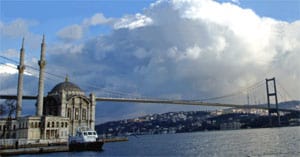Turkey Ponders Future After Euro No Votes
Turkeys frantic rush to conform to European standards is faltering as the EU reconsiders its own future direction.

|
Turkey is once again poised at a crossroads politicallyand perhaps economicallyas its decades-long quest to anchor itself with Europe suffers another setback. Bolstered by the lowest inflation rate in more than 30 years and economic growth that almost reached double digits last year, this strategically located nation bridging Western and Eastern cultures is eager to begin European Union accession talks in October. But analysts say French and Dutch voters recent decision to reject the European Constitution is a sign of growing popular discontent with the EUs rapid expansion and the competition for jobs with the swelling immigrant population. So after making a myriad of political and economic reforms over the past several years to curry favor at the EU negotiating table, Turkey finds itself needing to regroup.
The collapse of the constitution is a setback for Turkey. If I were a Turk and keen on accession, these would not be rosy days, says Charles Kupchan, a senior fellow and director of European Studies at the Council on Foreign Relations in Washington, DC. I would be surprised if they [negotiations] were not postponed or a face-saving compromise worked out, he adds.
The possible derailment of the EU accession talks isnt likely to stall Turkeys economic progress, but the sudden setback may make investors less likely to sink large amounts of money into this largely Muslim nation. While the economy is doing well and the EU issue is not fundamental to future economic growth, it makes Turkey less attractive to foreign investors, says Kupchan. But its not going to tank the economy. The EU accession would have taken years under the best of circumstances.
It has been the promise of entry into the coveted circle of European nations that sparked many of Turkeys recent reforms on issues from human rights violations to anti-corruption measures to fiscal reforms. These reforms in turn have given the country the political and economic stability that both local and foreign companies of all sizes crave when considering investing.
The carrot of EU membership was the catalyst for many of Turkeys reforms, says Omar Taspinar, director of the Turkey program at the Brookings Institution in Washington, DC. He adds that these reforms and the countrys subsequent macroeconomic stability produced a jump in foreign investment to approximately $1.5 billion in 2004. About $1 billion of that was in the banking sector. The remaining foreign dollars have typically been relatively small infusions in a variety of industries, including food and retail, telecommunications, infrastructure and petrochemicals.
Foreign direct investment in Turkey has rarely exceeded $1.2 billion annually, says Neeraj Jain, an official with the International Finance Corporation, even though the country offers foreign companies a large domestic market of nearly 70 million consumers, with many young people and a wide range of natural resources. Its somewhat of a paradox because Turkey has many of the assets that foreign investors look for, says Jain, principal strategy officer in the IFCs Department for Southern Europe and Central Asia. Part of the World Bank Group in Washington, the IFC promotes private sector investment in developing countries. Theyve lost out to locations in Eastern Europe, where companies can still export to Europe, he adds.
Labor costs are rising in Eastern Europe, though, and analysts believe companies with a longer-term vision will want to look at Turkey more seriously. It could serve as a cushion for foreign investors who want to go into new markets in Central Asia, says Jain, adding that Turkey needs to be more aggressive in selling itself as a business locationa void the IFC hopes to fill as it helps Turkey create an investment promotion agency. Unfortunately, Turkey has not done a good enough job of marketing itself, he adds.
The privatization of state-owned entities is another largely untapped area for both the Turkish government and foreign investors. The government has been distracted from any major privatization program by issues such as the EU accession talks and the IMF stabilization program, as well as unclear lines of responsibility among government ministries, Jain says. Theres no shortage of candidates. But the responsibility and accountability between ministries has not been clear, he explains, adding that officials are now developing the proper regulatory framework for selling off stakes in government-owned companies. According to World Bank officials in Ankara, about two-dozen companies are scheduled for sale this year, ranging from Trk Telekom and TPAO, the petroleum company, to Erdemir, an iron and steel company.
Jain agrees that a slowdown in the EU integration process is unlikely to seriously affect the Turkish economy. Most analysts expect growth of at least 5% in the next several years, with inflation remaining in single digits. I think the reforms in Turkey are internally driven, by the people and by the businesses, he adds. Turkish officials are working with the IMF and the World Bank on making the structural reformswhether revamping the tax and social security systems or trimming the budget deficitthat will give the country long-term macroeconomic stability.
|
Banking |
|
Banking is one sector in which the Turkish government has already made enough serious reforms to attract foreign investment. Ironically, it was the nations banking sector that helped kick off a financial crisis in early 2001 that forced officials to sharply devalue the local currency, the Turkish lira. Inflation soared to more than 50% as the economy contracted by 7.4% that year.
Since then, banking regulators efforts to clean up the financial system have resulted in a reduction of the number of banks from about 80 to around 50 and helped to lower the cost of funds. The sounder financial footing of the economy and the banks themselves has encouraged banks to expand their retail banking activities. Lending to small and mid-size businesses, as well as consumers, is on the rise, and analysts say other banking segments with potential include pension funds and asset management. In the past, the corporate market was the only one to lend to, says Neslihan Tombul, managing director and senior representative in the Bank of New Yorks Istanbul office. Now that has changed, and banks are developing relationships with small and mid-size businesses. Banks are holding the hands of their clients when times are tough, and in 10 years theyll have a real relationship. Tombul, who is the senior credit marketing officer for the banks operations in Turkey, adds that Turkish banks are also looking at the potential in selling banking products to young people. About 65% of the population in this nation of nearly 70 million people is under the age of 25. Theres a tremendous amount of potential. Young people lack good products. They need consumer loans and credit cards, she adds. All of these new banking opportunities have already generated intense interest among foreign banks. Some of the recent activity includes the Belgian-Dutch Fortis Groups pending purchase of nearly 90% of Disbank from Dogan Holding, a Turkish conglomerate. If approved, this would be the largest foreign investment to date in the Turkish banking sector, which is relatively small, with about $150 billion in assets. UniCredit of Italy purchased 50% of Koc Bank several years ago, and the Koc-UniCredit partnership is now trying to buy 58% of Yapi ve Kredi Bankasi, which would represent an $800 million investment by the Italian banking firm. Yapi ve Kredi Bankasi has made inroads in Turkeys growing credit card lending business. Late last year French bank BNP Paribas moved to buy a 50% stake in TEB Mali Yatirimlar, the majority shareholder of Turkish bank Trk Ekonomi Bankasi, from the Turkish conglomerate Colakoglu Group. Foreign banks see Turkey as an opportunity. They view Turkey as an expanding economy and an under-loaned economy, says Ed Thompson, senior director at Fitch Ratings Service in New York City. And the size differential is substantial. So for a relatively modest amount of money, they can make an investment. |
Geopolitical Outlook

|
|
|
Whether or not the EU-Turkish accession talks begin this October as planned, Turkey still offers the West a strategic locationpolitically, militarily and economicallybetween Europe, Asia and the Middle East. This nation stretches from Bulgaria in southeastern Europe to Georgia in southwestern Asia and sits north of Syria and Iraq.
Analysts say several political scenarios are emerging, and, in one, Turkey would align itself more closely with the US and Israel. But Bulent Aliriza, director of the Turkey project at the Center for Strategic and International Studies in Washington, doesnt expect Turkey to turn away from its 40-year effort to integrate with Europe. Its not an either or situation. The relationships [with the EU and the US] are complimentary, says Aliriza.
On the economic front, the US is too far away geographically to pick up the strong trade and investment ties that European companies have traditionally enjoyed with Turkey, says Aliriza. And since the US invasion of Iraq, US-Turkish political relations have been strained while anti-American sentiment has grown among the general population.
One pessimistic view of the emerging political situation holds that Turkeywith its large Muslim populationwould align itself with the East. Theres a geopolitical uncertainty, says Kupchan of the Council on Foreign Relations. Some wonder whether the nationalistic and Islamic forces will become stronger as a result of a sense of rejection by the EU.
Jain argues that Europe needs Turkey more than Turkey needs Europe. Both from a geopolitical standpoint and economically, they add to Europebringing natural resources, labor and new markets, Jain says. The EU should be desperately wanting Turkey.
BEST COMPANIES IN TURKEY, 2005
Global Finance selected 10 sectors that represent a cross section of a Turkish economy that grew by nearly 10% last year. We chose traditional sectors such as textiles and agriculture that, while contributing less to the gross domestic product, are still responsible for employing large segments of the countrys rural population; industrial areas such as autos and iron; and the fast-growing services sector, where industries including telecommunications, tourism and other services are contributing more than half of the countrys gross domestic product.
The top company in each category was chosen using research and input from financial analysts, consultants, company executives and business leaders both in the United States and in Turkey. The criteria included an objective and subjective mix of assets, profitability, strategic and expanding relationships, customer service, innovation and management savvy.
BEST BANKS IN TURKEY, 2005
Global Finance selected five sectors that represent some of the more traditional banking servicessuch as commercial services for corporationsof Turkeys universal-type banks, as well as new growth areas such as the growing credit card lending business.
In order to compile the complete list, the top financial institution in each category was chosen using research and input from financial analysts, consultants, bank executives and business leaders both in the United States and in Turkey. The criteria used to determine the winners included an objective and subjective mix of assets, profitability, strategic and expanding relationships, customer service, innovation and management savvy.
Paula L. Green



